Although health outcomes have improved in low-income and middle-income countries (LMICs) in the past several decades, a new reality is at hand. Changing health needs, growing public expectations, and ambitious new health goals are raising the bar for health systems to produce better health outcomes and greater social value. But staying on current trajectory will not suffice to meet these demands. What is needed are high-quality health systems that optimise health care in each given context by consistently delivering care that improves or maintains health, by being valued and trusted by all people, and by responding to changing population needs.
In this Commission, we assert that providing health services without guaranteeing a minimum level of quality is ineffective, wasteful, and unethical. Moving to a high-quality health system—one that improves health and generates confidence and economic benefits—is primarily a political, not technical, decision. National governments need to invest in high-quality health systems for their own people and make such systems accountable to people through legislation, education about rights, regulation, transparency, and greater public participation. Countries will know that they are on the way towards a high-quality, accountable health system when health workers and policymakers choose to receive health care in their own public institutions.

